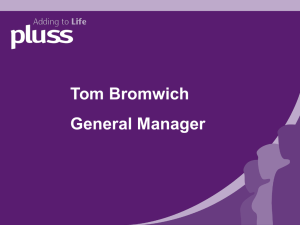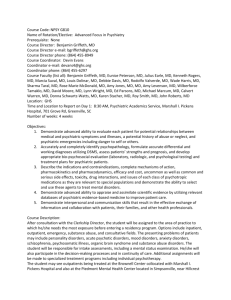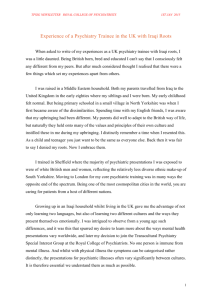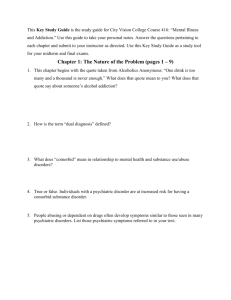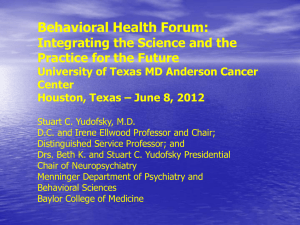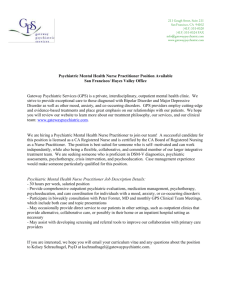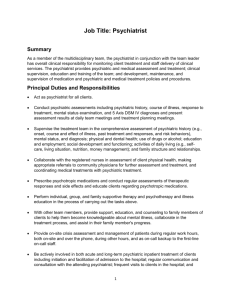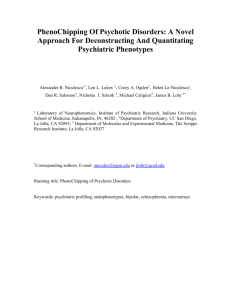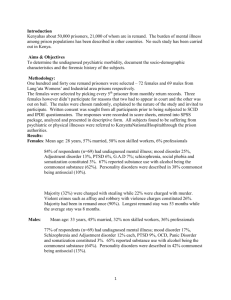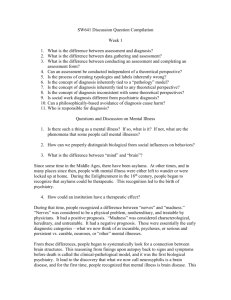4/22 Medical Explorers Notes Dr. Daniel Mason Psychiatry
advertisement
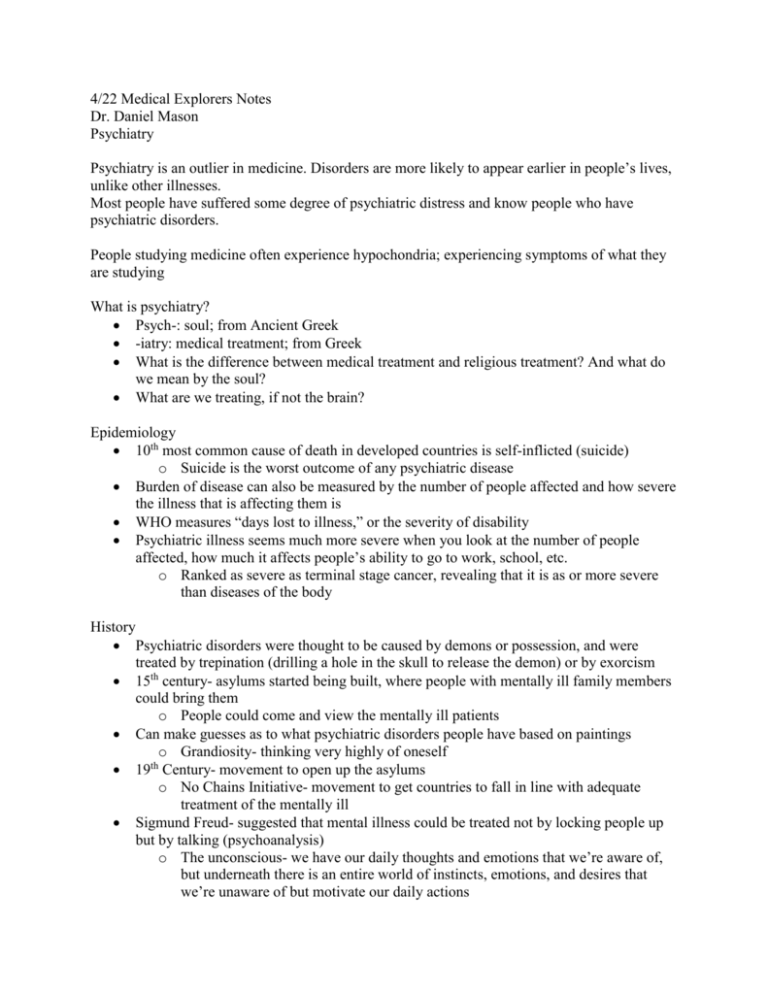
4/22 Medical Explorers Notes Dr. Daniel Mason Psychiatry Psychiatry is an outlier in medicine. Disorders are more likely to appear earlier in people’s lives, unlike other illnesses. Most people have suffered some degree of psychiatric distress and know people who have psychiatric disorders. People studying medicine often experience hypochondria; experiencing symptoms of what they are studying What is psychiatry? Psych-: soul; from Ancient Greek -iatry: medical treatment; from Greek What is the difference between medical treatment and religious treatment? And what do we mean by the soul? What are we treating, if not the brain? Epidemiology 10th most common cause of death in developed countries is self-inflicted (suicide) o Suicide is the worst outcome of any psychiatric disease Burden of disease can also be measured by the number of people affected and how severe the illness that is affecting them is WHO measures “days lost to illness,” or the severity of disability Psychiatric illness seems much more severe when you look at the number of people affected, how much it affects people’s ability to go to work, school, etc. o Ranked as severe as terminal stage cancer, revealing that it is as or more severe than diseases of the body History Psychiatric disorders were thought to be caused by demons or possession, and were treated by trepination (drilling a hole in the skull to release the demon) or by exorcism 15th century- asylums started being built, where people with mentally ill family members could bring them o People could come and view the mentally ill patients Can make guesses as to what psychiatric disorders people have based on paintings o Grandiosity- thinking very highly of oneself th 19 Century- movement to open up the asylums o No Chains Initiative- movement to get countries to fall in line with adequate treatment of the mentally ill Sigmund Freud- suggested that mental illness could be treated not by locking people up but by talking (psychoanalysis) o The unconscious- we have our daily thoughts and emotions that we’re aware of, but underneath there is an entire world of instincts, emotions, and desires that we’re unaware of but motivate our daily actions o The thinking and organizing part of the mind is the Ego. It receives pressure from the parts of the unconscious which are the Id (the instincts, emotions, desires) and the Superego (the “parental” function of the brain, more observant and controlling) Thorazine- the 1st psychiatric drug about 50 years ago) o Psychiatric illnesses were mostly treated through talking or other alternative methods prior to that o Now, much of psychiatric treatment is very medication-oriented, maybe even too medication-oriented Psychiatric Illnesses DSM- an attempt to get psychiatrists to speak the same language. Provides a set of organized symptoms, classifies psychiatric illnesses by symptoms o Very controversial o In real life, these disorders have a lot of gradation. It is very difficult to say what is and isn’t illness Depression- most commonly diagnosed of the mental illnesses defined by the DSM o Major Depressive Disorder 10%-25% of women 5%-12% of men o Defined as more than 2 weeks of 5 or more of: Depressed mood Anhedonia- inability to feel happy Weight loss Change in sleep Psychomotor changes Feelings of guilt or worthlessness Low energy Poor concentration Thoughts of death o Treatments Antidepressants (Prozac, Zanax, Zoloft, etc.) SSRI’s- Selective Serotonin Response Inhibitors- increase the amount of serotonin at neural synapses Most medications take 4-6 weeks to start working Psychotherapy CBT- Cognitive Behavioral Therapy Psychodynamic psychotherapy Many others ECT- Electroconvulsive Therapy. Patients are given anesthesia and a paralytic agent, then are shocked by electricity, causing the brain to seize. TMS Bipolar Disorder o “Manic-Depression” o Mania Inflated self-esteem or grandiosity Decreased need for sleep More talkative than usual or pressure to keep talking Flight of ideas or subjective experience that thoughts are racing Distractability (attention too easily drawn to unimportant or irrelevant external stimuli) Etc. Hypomania- not as severe as mania, doesn’t interfere with people’s lives as much, but same list of symptoms o Treatments for Bipolar Disorder Mood Stabilizers Lithium remains perhaps the best treatment for classic bipolar disorder) Antipsychotics Sedatives Antidepressants Psychotherapy Schizophrenia o 1% prevalence? o 2 or more symptoms for > 1 month Delusions Hallucinations (a larger portion of the population experiences this)usually auditory or visual Disorganized speech, which is a manifestation of formal thought disorder Grossly disorganized behavior (dressing inappropriately, crying frequently) or catatonic behavior Negative Symptoms: Blunted affect (lack or decline in emotional response), alogia (lack or decline in speech), or avolition (lack or decline in motivation) o Social or occupational dysfunction... Recommended further reading: An Unquiet Mind by Kay Redfield Jamison The Center Cannot Hold- Elyn Saks

